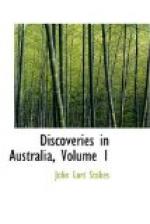BRUNY ISLAND LIGHTHOUSE.
On opening d’Entrecasteaux Channel, we observed a splendid lighthouse erected by Sir John Franklin, on the South-West extremity of Bruny Island, and which serves to guide entering vessels clear of the shoals in the mouth of that channel, formerly fatal to so many a luckless voyager, wrecked within sight of the hoped-for shore, upon which he might never set his foot. The situation of the lighthouse appears admirably chosen, and it may readily be seen in the daytime, a wide gap being cut in the woodland behind it. In alluding to the great improvement in the navigation of d’Entrecasteaux Channel, by the erection of the lighthouse on Bruny Island, it must be remembered that we are indebted to the indefatigable exertions of Lieutenant Burnett, R.N., who had been appointed Marine Surveyor to the colony by the Admiralty, for a knowledge of the exact position of its dangers. In prosecuting this service, I grieve to say, his life was lost, by the upsetting of a boat in one of those sudden gusts of wind which sweep down the steep valleys on the sides of that channel. This sudden termination of Lieutenant Burnett’s labours has been deplored alike by the colony, and by the profession of which he was so bright an ornament.
We entered Storm Bay after dark against a strong North-West wind, which quite vindicated the title of the bay to the name it bears, and so much delayed our progress, that it was morning before we were abreast of the Iron Pot lighthouse at the entrance of the Derwent River, and after dark before we reached Sullivan’s cove, Hobart.
Although the passage up the river was tedious and annoying from the adverse and squally wind that prevailed throughout the day, we were almost repaid for the delay by the scenery each tack brought to our view, and to which the remembered aspect of the shores we had so recently quitted, seemed by contrast to add a yet more delightful verdure.
As we proceeded, we noticed since our last visit, several bare patches in the woodlands, where the axe and the brand of the enterprising colonists had prepared the way for that cultivation under the influence of which the landscape wore in places an almost English aspect. This fancied resemblance—inspiring by turns delightful anticipation and fond regret—was heightened by the occasional addition of many pretty little cottages scattered along the sloping banks of the river, and adding to the luxuriant appearance of the country, the peaceful grace and sanctity of home.
July 19.
We were detained at Hobart till the 19th, the bad state of the weather rendering it impossible to complete the requisite observations for rating chronometers, etc.
MOUNT WELLINGTON.




